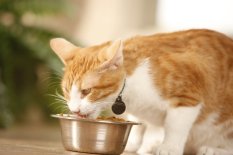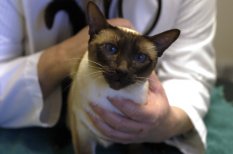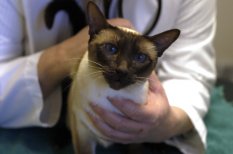

Imagine eating the same diet from infancy all the way through adulthood? As we move through life our needs keep changing – from the amount of calories we must take in to the balance of nutrients that keep us healthy.
“Our pets have similar needs,” says Dr. Mike Bondar, Veterinarian and Host of Animal House Radio. “From the time they are kittens or puppies through their mature years, key factors influence the kind of diet they need to prevent a range of health issues.”
Here are four reasons why a one-size-fits-all food for your pet is no better than a one-size-fits-all diet for you:
Life stage – The wrong pet food for a pet at any life stage can deliver either a deficiency or excess of nutrients and calories. For example, puppies and kittens need the right balance of nutrients to help grow strong bones, teeth and a healthy coat. That same diet for adult pets could lead to health issues ranging from obesity to bone loss to kidney disease. Be wary of any pet food advertised as “All Life stages.”
Lifestyle or physical activity – If your cat or dog is very physically active their dietary needs are much different from more sedentary pets, much like an athlete needs more calories and a different balance of nutrients than someone with normal or low physical activity.
Weight or size – Is your dog a large breed? Is your cat overweight? They likely have special dietary needs that call for a specially formulated pet food, such as a light pet food to manage calories, while providing the right nutrients.
Overall health needs – Talk to your veterinarian about your pet’s overall health needs and any special considerations like oral health, food allergies, hairball control, or stomach sensitivities that might require a pet food formulated to meet them. Be sure to purchase specially formulated pet foods that cater to various life stages, dietary and health needs.
Now that you’ve learned a bit about addressing your pet’s dietary needs, take this quick quiz and get a leg up on protecting your pet’s overall health:
Q. 1 - Improper feeding can increase your puppy's risk of:
a) Excessively fast growth
b) Growth-related skeletal problems
c) Poor immune response
d) All of the above
Q. 2 - If your dog vomits or has diarrhea after eating it could mean he/she has:
a) A food allergy
b) Dehydration
c) Colitis
d) Canine dermatitis
Q. 3 – What percentage of Canadian pets suffer from obesity?
a) 5%
b) 15%
c) 25%
d) 35%
Q. 4 - Which of the following human health concerns can also affect cats and dogs?
a) Heart disease
b) High blood pressure
c) Diabetes
d) All of the above
Q. 5 - True or False: Table scraps are better for your pet than prepared pet food because they are fresh.
ANSWERS:
Q1 = (d). Improper feeding can contribute to obesity and a range of health issues;
Q2 = (a). Allergies aren't fun for anyone, but especially so for your dog who can't tell you what's making him/her so sick. Also consider whether you’ve just switched your dog or cat’s food. If so, it’s important to transition him/her onto the new food over time to avoid digestive problems;
Q3 = (d). Thirty-five per cent of Canadian pets suffer from obesity.
Q4 = (d). Poor nutrition can lead to obesity and all of these health issues.
Q5 = False. Table scraps might seem like a treat to your pet, but they could be contributing to a weighty problem. For a 10-lb cat a 1-oz piece of cheddar cheese is the equivalent of 3½ hamburgers to a 150 lb woman.
This information is brought to you by Hill’s Science Diet.
 When Is It Time to Consult Your Veterinarian?
Pets often ha
When Is It Time to Consult Your Veterinarian?
Pets often ha
 Normal Aging & Expected Changes in Older (Senior, Geriatric) Cats
We expect cer
Normal Aging & Expected Changes in Older (Senior, Geriatric) Cats
We expect cer
 Foods to Avoid Feeding Your Dog
Question: Whi
Foods to Avoid Feeding Your Dog
Question: Whi
 How to Prevent a Lost Pet
Accidents can
How to Prevent a Lost Pet
Accidents can
 Keeping Up with Your Pet's Health: Vaccinate with Rabies Shots
A slow, agoni
Keeping Up with Your Pet's Health: Vaccinate with Rabies Shots
A slow, agoni
Copyright © 2005-2016 Pet Information All Rights Reserved
Contact us: www162date@outlook.com